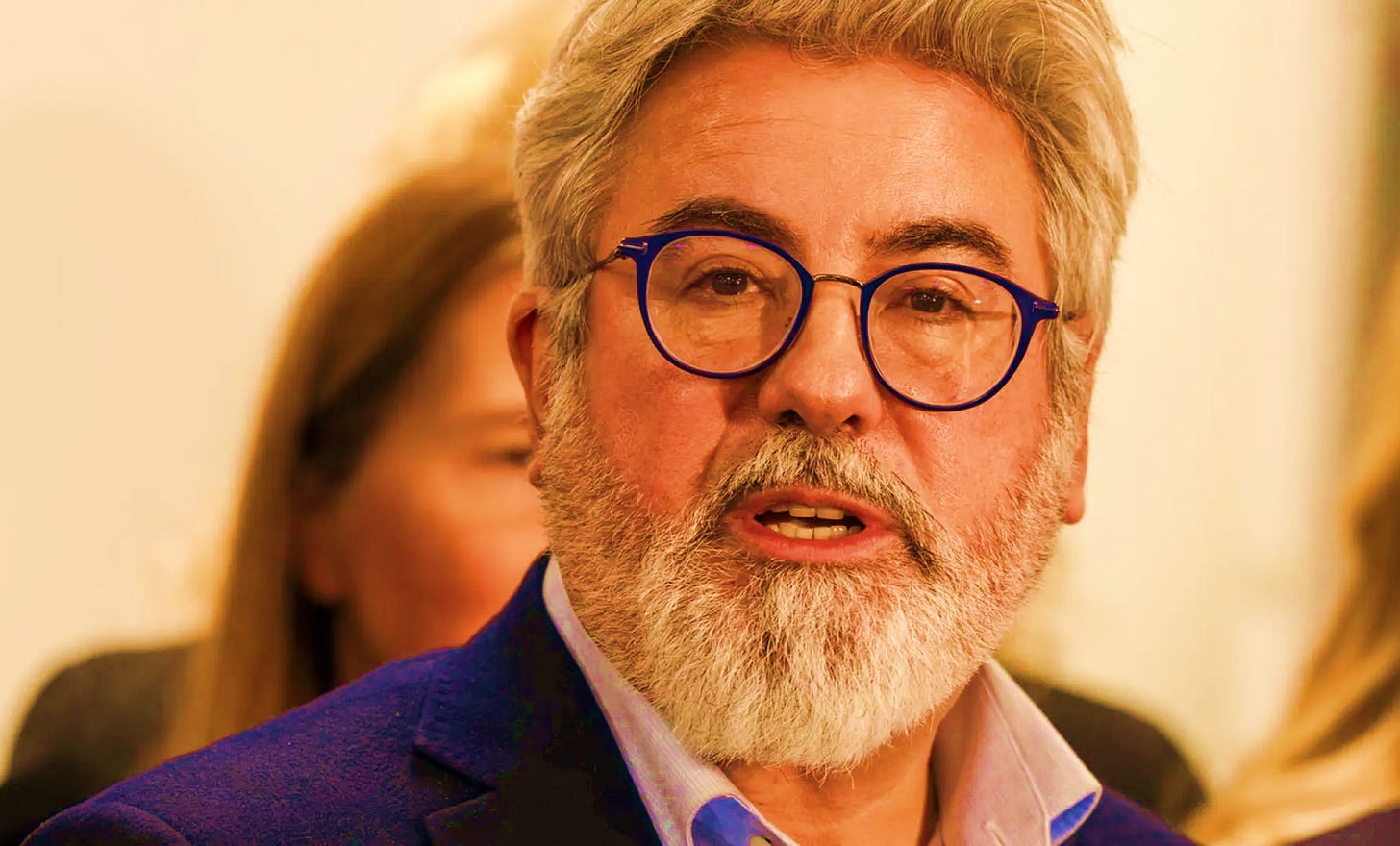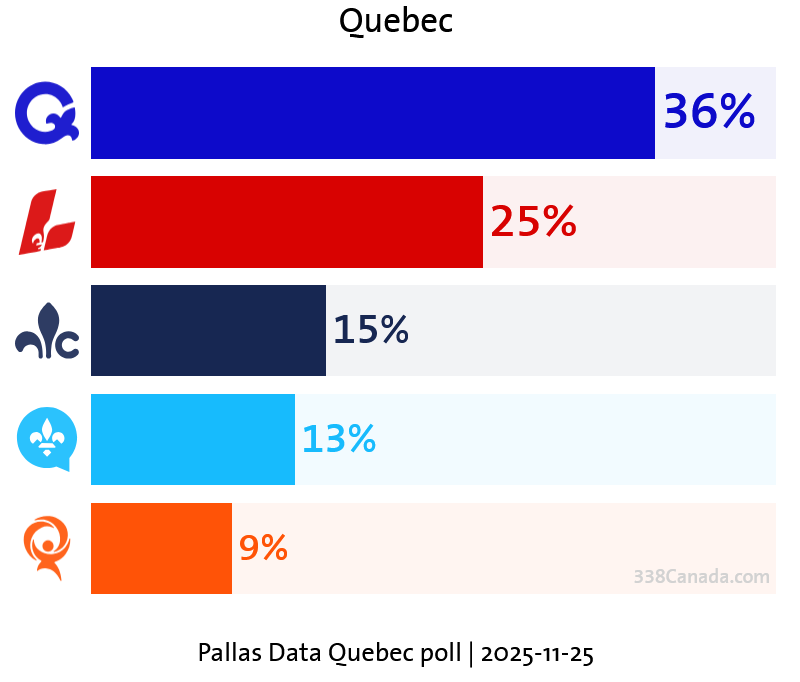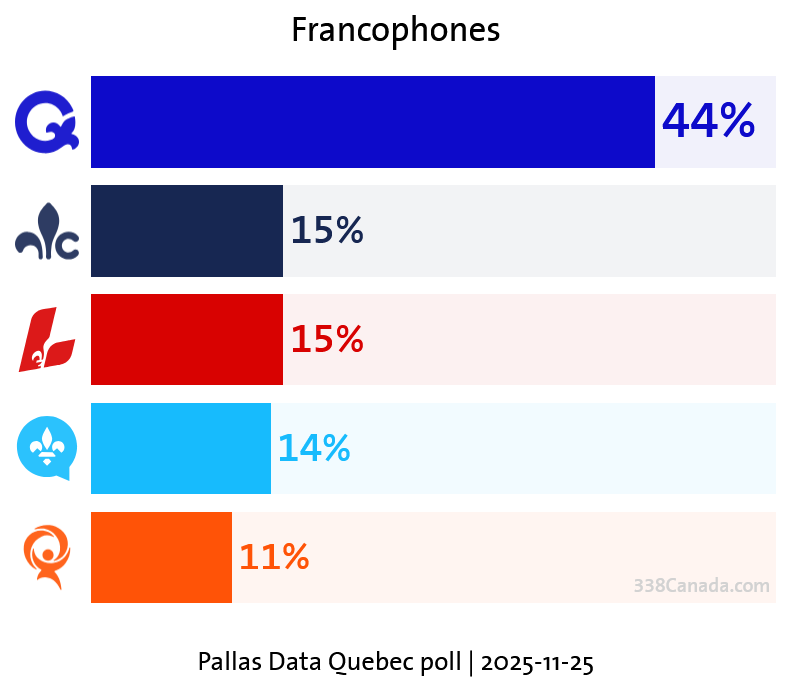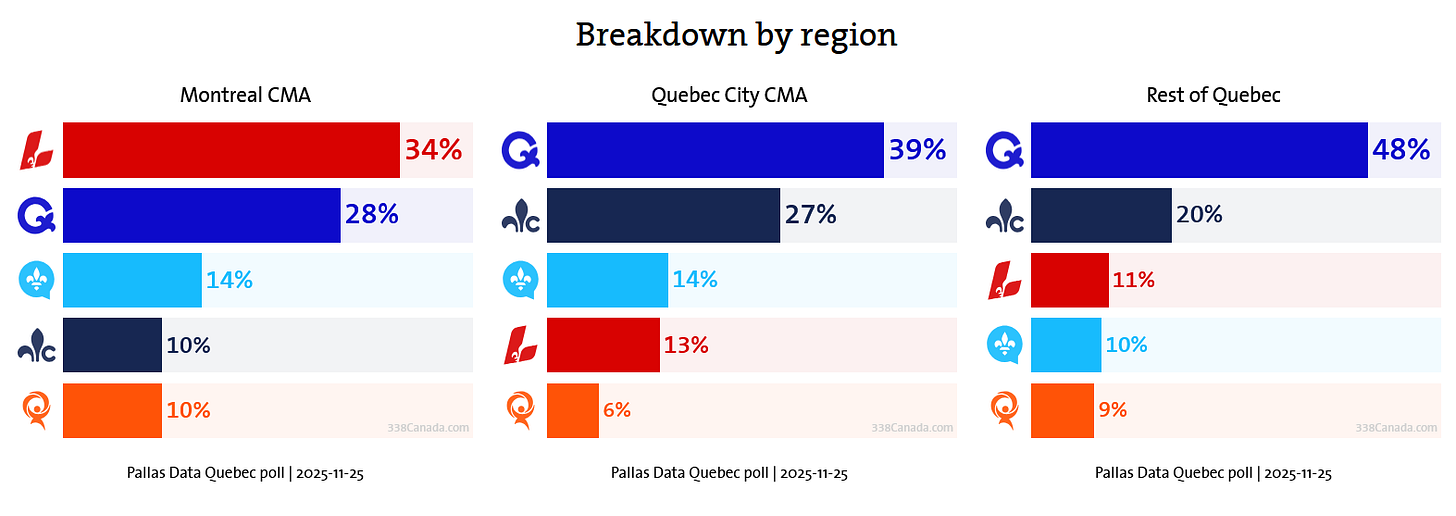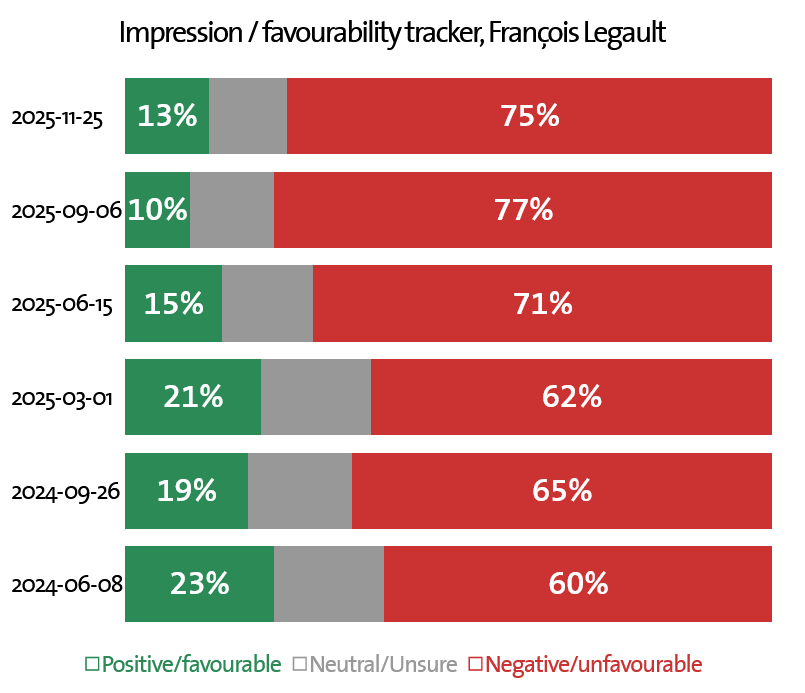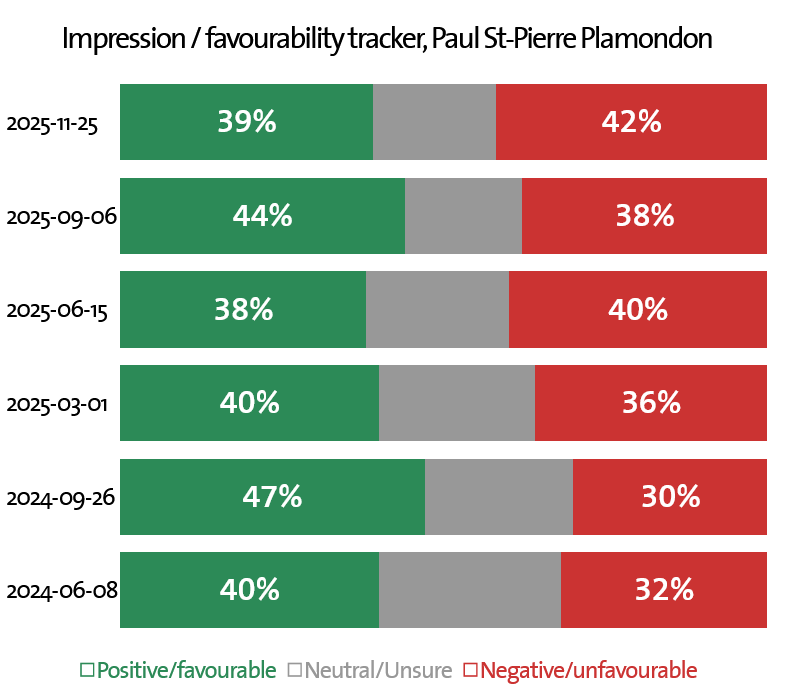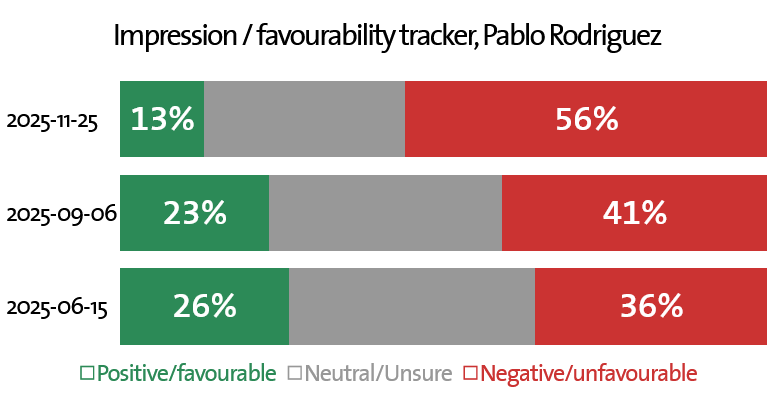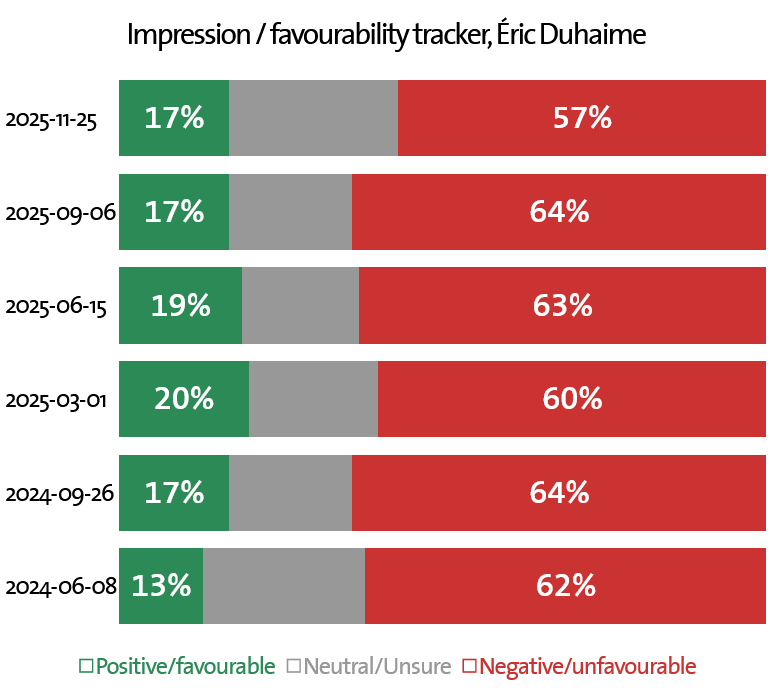Pallas Data: Pablo Rodriguez Drags Quebec Liberals Down
New Quebec polling shows the PQ firmly ahead — while Rodriguez’s personal numbers sink to new lows.
The Parti Québécois (PQ) still leads the Quebec Liberal Party (QLP) by 11 points in voting intentions, according to a new Pallas Data poll conducted on behalf of 338Canada and L’actualité magazine, the first survey fielded and published since the crisis began to seriously shake the QLP.
And the events that led to Marwah Rizqy’s dismissal as the Liberals’ parliamentary leader in the National Assembly are hurting Pablo Rodriguez: numbers show he is the only leader to drag his party down. While the PLQ is polling at 25%, Pablo Rodriguez is barely getting 13% positive impressions from voters. The other four leaders are receiving as much, if not more, appreciation than their parties.
The Parti Québécois therefore remains at the top of voting intentions, with 36% support among decided and inclined voters. This is a two-point drop from the previous Pallas Data–338Canada–L’actualité poll last September—a variation within the margin of error.
The PLQ also lost two points, leaving it still 11 points behind the leaders. A Léger poll published on November 13 by Quebecor Media suggested an upturn for the Liberals, who had closed the gap with the PQ to five points. But that was before the crisis erupted.
Even though this score is close to the weighted average that the Liberals have been getting in the polls since last summer, the news is far from rosy for the Liberal team: the party has only 15% support among francophone voters. The gap between the PQ and the PLQ is therefore much wider than the province-wide numbers alone suggest.
In this regard, the Conservative Party of Quebec is likely to cause headaches for the PLQ and the Coalition Avenir Québec (CAQ). Éric Duhaime’s party is in second place everywhere outside the Greater Montreal area, with a 13- and 9-point lead over its closest rivals, the CAQ in Quebec City and the Liberals in the rest of the province.
If these figures hold steady until next October, they could give the Liberals and CAQ a run for their money in their efforts to hold on to some of their gains.
Nothing new for the CAQ and Québec solidaire, despite a lot of movement in the ranks of both parties since the last Pallas Data poll. With 13% support, including only 14% among Francophones and 10% outside urban centers, François Legault’s party does not seem to be immediately benefiting from the negative media coverage afflicting the PLQ and its leader, Pablo Rodriguez. The September poll gave the CAQ 11% support.
Québec solidaire trails with 9% of voting intentions, a result that is fully in line with QS’s range since last spring.
Quebecers lukewarm about their options
While the picture of voting intentions has changed little compared to the average over the last few months, Quebecers are increasingly ambivalent about the electoral choices presented to them.
When asked, “Do you have a favorable or unfavorable impression of...,” none of the leaders received the approval of a majority of respondents.
Three out of four Quebecers (75%) say they have an unfavorable impression of the current premier, compared to only 13% who have a favorable opinion of François Legault, a net approval rating of -62. In September, his net score was -67.
However, Paul St-Pierre Plamondon, who has the best results among the five leaders surveyed, is seeing his star fade, as more voters seem to disapprove of his work than approve of it. His net score of -3 (42% unfavorable impressions versus 39% favorable impressions) is not exactly triumphant either. Paul St-Pierre Plamondon is still the only leader whose positive impressions exceed the 20% mark.
As mentioned above, this poll contains no good news for Liberal leader Pablo Rodriguez: 56% of respondents have a negative impression of him, compared to only 13% who express a positive opinion—a net rating of -43. Among French-speaking voters, the results are disastrous: 62% have an unfavorable impression, compared to a meager 11% who have a favorable impression.
As for Éric Duhaime, even though his overall numbers remain firmly in the red (57% unfavorable, 17% favorable), his net score of -40 is his best result since the Pallas poll series began in the summer of 2024. In September, his net score was -47.
Two years ago, in November 2023, the Parti Québécois dethroned the CAQ in first place in voting intentions—and the sovereigntist party has not been truly threatened since, according to surveys by all polling firms combined. With 10 months to go before the campaign begins, public opinion seems to have crystallized, but recent history reminds us that the numbers can shift quickly in the pre-campaign period—just ask Pierre Poilievre.
This Pallas Data poll was conducted on November 24 and 25, 2025, among a random sample of 1,102 Quebec respondents aged 18 and over. Data was collected by interactive voice response using telephone calls to landlines and cell phones. The poll was commissioned by Qc125/338Canada. The margin of error on the complete sample is ±3%, 19 times out of 20. You can find the poll report here.


